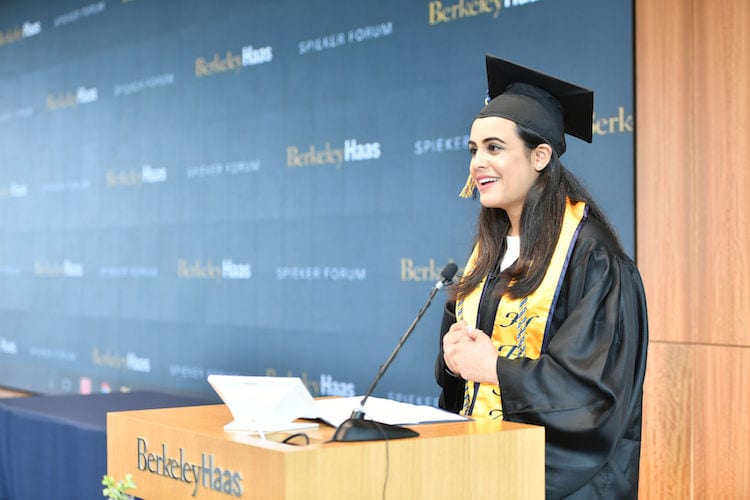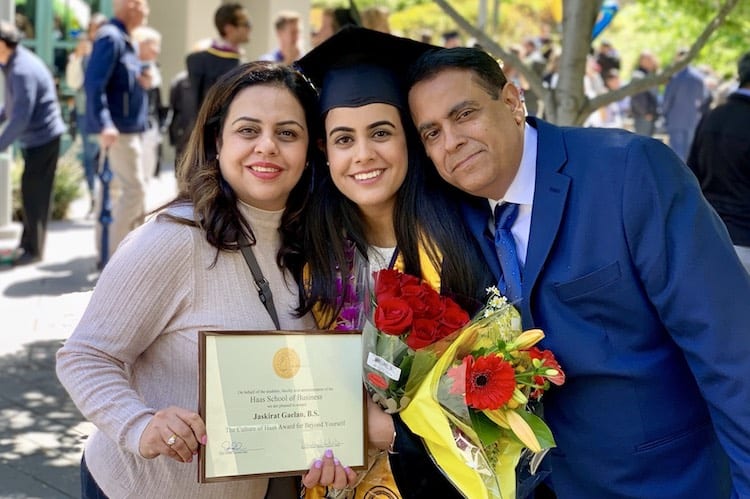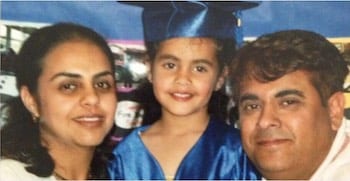In honor of Asian Pacific American Heritage Month, we’re featuring profiles and interviews with members of our Haas community.

When Jaskirat Gaelan, BS 19, was honored at last Sunday’s commencement with the “Beyond Yourself” Haas Culture Award, few would argue that it wasn’t deserved.
The daughter of immigrants from Delhi, India, Gaelan has served as president of the Haas Business School Association (HBSA), and as an associate consultant with the student-run Bay Area Environmentally Aware Consulting Network (BEACN), helping local nonprofits and small businesses to be more environmentally friendly and profitable. She’s also used her henna and photography talents to collect donations for St. Jude Children’s Research Hospital.
We spoke with Gaelan, who will work at Accenture in San Francisco after graduating, about growing up Sikh in Modesto, California, her family’s commitment to education, and her commitment to service.

Tell us about your background.
I immigrated to California with my parents from Delhi, India, when I was four years old. We first lived in Alameda, and my parents used to bring me to Berkeley when I was little to show me the Campanile and to show me what college was like. Getting me into a good school was a really big deal for them.
We later moved to Modesto, California. My parents had an ice cream store and a small convenience store and worked from 6 a.m. until 10 at night. I started working when I was young and helped them with whatever they were doing. This year they opened up a beautiful furniture gallery. They inspire me with the mentality: We start with what we have and dream big.

How did the diversity of California influence you?
I love that my parents chose to immigrate to California. California is a melting pot and I really felt that. My friends were a diverse group—Mexican, Taiwanese, Indian. What brought us together was the desire to learn and ask questions and explore. I think that’s why we all got along so well. We all believed in how important school is and had the curiosity to learn and seek help and ask questions. Many of us have parents who immigrated here and were busy with their businesses and didn’t go through the process of the SAT and learning about scholarships and financial aid.
What do you think people misunderstand about Sikhs?
Sikhs are often misidentified to be of other religions. In reality, Sikhism is a unique faith and is not derived from any other religion. Sikhism spans all geopolitical boundaries. People believe Sikhism is all about outer appearance. In reality, Sikhism is a simple religion with three fundamental principles: Naam japna (remember God and goodness in everything that we do), Kirat Karna (earn an honest living), and Vand Chakna (selflessly serve others).
Has being a Sikh in the U.S. been challenging for you?
The nearest Gurdwaras (Sikh places of worship) have been 30 to 40 minutes from the houses I’ve lived in, but every trip there has only been empowering to me. Though I may not be a strict follower, I have a deep desire to explore more about Sikhism.
What was your experience as an Asian American and a Sikh at Berkeley Haas?
I took a class in Asian-American history my freshman year. I loved it, I loved the people. It created an avenue for us to open up to each other about our families, our pasts. It’s been exciting here. I’ve met many other Asian Americans, children of immigrants. We realized that so many things about us, from how our parents encourage us to the types of jobs we want, are all very similar.
Before coming here, I never really had other Sikh students in my classes. (The Sikh population isn’t that large in Modesto.) But here, I could connect with many through the Sikh Students Association and other clubs. That was beneficial because they understood what my family is like, what my culture is like. They’ve helped me with applications and job searching, even praying with me before a class or cheering me up. Having that encouragement was why I was able to get through and figure things out.
What lessons have you learned from your community and culture that you want to share with others?
I’ve learned to help others. You can make a difference in more than your own life. Any success we have is much sweeter if it helps more than just you. Incorporate service at every point in your life, however you can, whether it’s helping one person, or a school, or a business, or a community. I’ve also met a lot of Asian Americans who have helped me to learn who I am and who I want to be. Regardless of your background, be willing to share your culture. It’s so valuable to be surrounded by diverse groups of people. Figuring out things together will help empower us even more to make an even bigger impact.